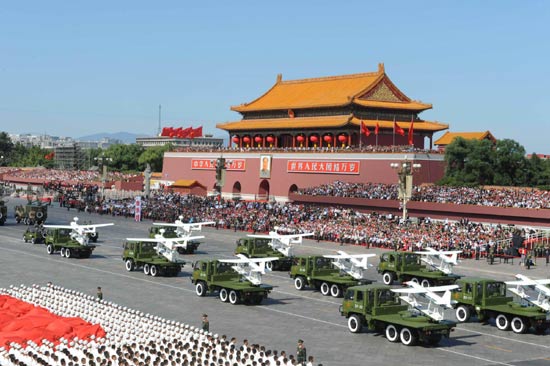Farcical speculation about victory parade
Updated: 2015-01-29 07:34
By Lun Ping(China Daily)
|
||||||||
 |
|
Unmanned aircraft receives inspection during a military parade in celebration of the 60th anniversary of the founding of the People's Republic of China, on Beijing's Tian'anmen Square, October 1, 2009. [Xinhua] |
"China will flex its military muscle." This seems to be the message many Western and Japanese media outlets are giving by speculating that China might hold a grand military parade in September.
This is a typical example of much media ado about nothing, because even if a military parade is held in September to mark the 70th anniversary of the victory in the Chinese People's War of Resistance Against Japanese Aggression (1937-45), it will only be part of a series of activities to commemorate the anti-fascist war.
China has no intention of showing off its military might to any country, even at a time when Japanese politicians' irresponsible comments and contentious moves have raised tensions in East Asia. It's true the parade, if it is held, will be special. In 1999 and 2009, special parades were held on the 50th and 60th anniversaries of the founding of the People's Republic of China. But the "victory parade" will not be held on the National Day.
Besides, it will only be part of the activities to remind the world of what happened on the eastern battlefield during World War II. As a country which played an extremely important role in the fight against fascism in the East, the Asian battlefield is yet to get its due recognition compared with the European battlefield where China's counterparts fought against Nazi Germany and fascist Italy.
China suffered over 35 million casualties in the eight-year-long War of Resistance Against Japanese Aggression. About 300,000 its people lost their lives in the six-week-long Nanjing Massacre alone, which started in December, 1937, immediately after Japanese troops took over the city. The Chinese people, through their war of resistance, depleted Japan's resources and thus prevented it from launching more attacks on other countries, which played a vital role in realizing the victory in the anti-fascist war.
China, therefore, has every reason to follow the international practice of highlighting its losses during World War II and its sacrifices that led to the victory of the Allies. On Jan 27, Poland held a ceremony to mark the 70th anniversary of the liberation of the Auschwitz concentration camp. Russia will hold a ceremony in May to mark its victory in the Great Patriotic War. And these programs are not aimed at spreading hatred and turning people against their past enemies; instead, they are attempts to remind the world to be vigilant against the threats to peace.
The Japanese people, who were exploited by their rulers and the imperial army, paid a heavy price. In just the two cities of Hiroshima and Nagasaki, about 130,000 Japanese were directly killed after the US dropped an atomic bomb on each of the cities in August 1945.
With some Japanese politicians now trying to whitewash Japan's war crimes, the world will be watching closely what Japanese Prime Minister Shinzo Abe says on Aug 15, the day when Japan surrendered to the Allies 70 years ago. Abe has hinted that his statement might deviate from the historic statement of former Japanese prime minister Tomiichi Murayama, who admitted Japan's war crimes. If Abe does so, he will not only challenge the postwar international order, but also cast a shadow over East Asia and harm the interests of the Japanese people.
China is a peace-loving country that follows a defensive defense strategy. If held, the military parade to mark the victory in the war of resistance will only show the Chinese military's resolution to protect the nation and its people. Therefore, China's activities to mark the victory will be a tribute to the people across the world who laid down their lives in the anti-fascist war.
The author is a writer with China Daily.
- Global health entering new era: WHO chief
- Brazil's planning minister steps aside after recordings revelation
- Vietnam, US adopt joint statement on advancing comprehensive partnership
- European border closures 'inhumane': UN refugee agency
- Japan's foreign minister calls A-bombings extremely regrettable
- Fukushima impact unprecedented for oceans: US expert

 Stars of Lijiang River: Elderly brothers with white beards
Stars of Lijiang River: Elderly brothers with white beards
 Wealthy Chinese children paying money to learn British manners
Wealthy Chinese children paying money to learn British manners
 Military-style wedding: Fighter jets, grooms in dashing uniforms
Military-style wedding: Fighter jets, grooms in dashing uniforms
 Striking photos around the world: May 16 - May 22
Striking photos around the world: May 16 - May 22
 Robots help elderly in nursing home in east China
Robots help elderly in nursing home in east China
 Hanging in the air: Chongqing holds rescue drill
Hanging in the air: Chongqing holds rescue drill
 2.1-ton tofu finishes in two hours in central China
2.1-ton tofu finishes in two hours in central China
 Six things you may not know about Grain Buds
Six things you may not know about Grain Buds
Most Viewed
Editor's Picks

|

|

|

|

|

|
Today's Top News
Liang avoids jail in shooting death
China's finance minister addresses ratings downgrade
Duke alumni visit Chinese Embassy
Marriott unlikely to top Anbang offer for Starwood: Observers
Chinese biopharma debuts on Nasdaq
What ends Jeb Bush's White House hopes
Investigation for Nicolas's campaign
Will US-ASEAN meeting be good for region?
US Weekly

|

|








